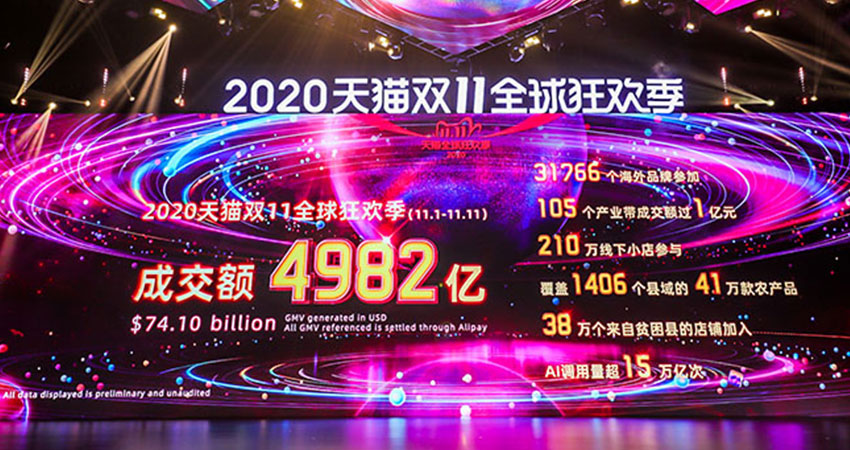Boding well for the holiday spend here, the U.S. was the top seller of goods during Alibaba’s Singles Day 2020, which raked in $116 billion combined on Alibaba and JD.com, Reuters said.
Alibaba itself reported 498.2 billion yuan in gross merchandise value (GMV), or $74.1 billion, while JD.com said its Singles Day GMV was 271.5 yuan or $40.72 billion. U.S. retailers saw more than $5 billion in sales to China over the 11-day event.
“The most important message to U.S. brands is that a China strategy and a digital strategy is going to be critical in the post-pandemic world,” said Michael Evans, president of Alibaba in an interview on CNBC. “We’ve seen enormous interest in both large businesses like Apple and Estee Lauder and many big brands like Nike, but smaller brands that produce terrific products also have ability to reach that China market.”
The 2019 version of Singles Day or 11.11 saw $38.4 billion in GMV in a single day, according to Alibaba, with 99 brands eclipsing 100 million yuan in GMV, or $15 billion in today’s rates. This year the extravaganza featured deals from Nov. 1-3, and then again on Nov. 11, as well as presale periods from Oct. 21-31 and Nov. 4-10.
By comparison, Amazon’s Prime Day took in just under $10 billion over two days in mid-October, according to eMarketer.
Alibaba said the event was stretched out to allow for logistical and delivery challenges, much as is the case with the peak holiday season here, while also giving sellers more time to prepare their operations to handle the sales surge.
This year, 470 brands realized over 100 million yuan in GMV, Alibaba reported, or about $15 billion. It also said the sales of goods in overseas warehouses during the first minute of Singles Day equaled the first hour during the 2019 event.
In 2020, 250,000 brands participated in Singles Day, 31,000 of them from outside of China; 2,600 of them were doing so for the first time.
Livestreaming commerce, a trend that has really taken off in China and is just now starting to take hold here, was a big part of Singles Day, Alibaba reported. It said more than 30 livestreaming channels featured on Taobao Live generated more than 100 million yuan in GMV.
Tom McFadyen, founder and CEO of McFayden Digital which creates marketplace platforms for B2C and B2C sellers including Albertson’s, Telaflora and Anheuser-Busch, said AliExpress boosted logistics subsidies for Chinese sellers by 5x this year to help smooth out Singles Day operations.
“They did it to speed up delivery and reduce costs for customers,” McFadyen said. “The idea was to enable them to deliver a consistent customer experience (for Singles Day) during a time when logistics networks are saturated from the pandemic.”
While a growing list of retailers like Target, Walmart and many others create their own promotional events every year to take advantage of Prime Day buzz, marketplaces here do not similarly draft on Singles Day since most U.S. consumers are unfamiliar with it. “There’s much less of a halo effect,” he said.

